人教版新目标九年级Unit 13 We're trying to save the earth! 课件(共52张PPT)
文档属性
| 名称 | 人教版新目标九年级Unit 13 We're trying to save the earth! 课件(共52张PPT) |
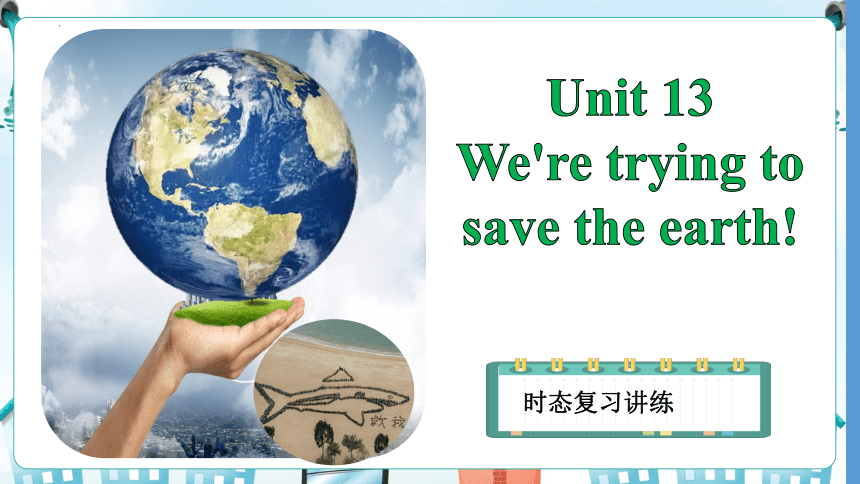
|
|
| 格式 | pptx | ||
| 文件大小 | 4.4MB | ||
| 资源类型 | 教案 | ||
| 版本资源 | 人教新目标(Go for it)版 | ||
| 科目 | 英语 | ||
| 更新时间 | 2023-12-25 00:00:00 | ||
图片预览

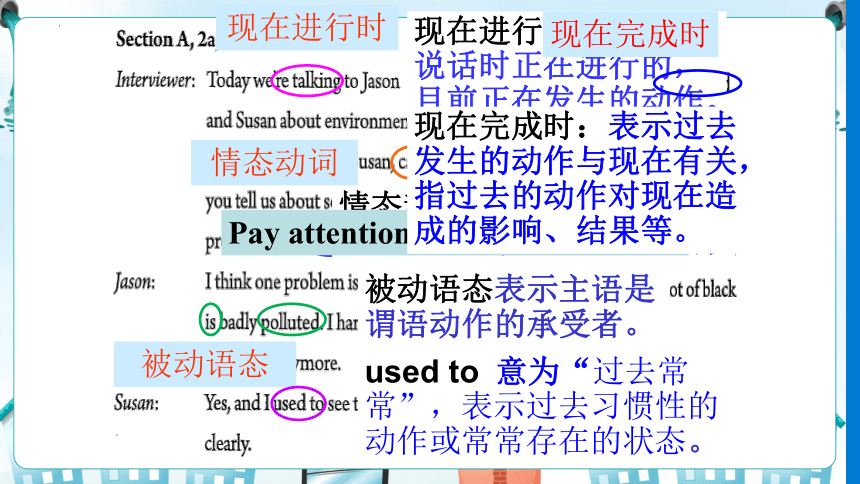
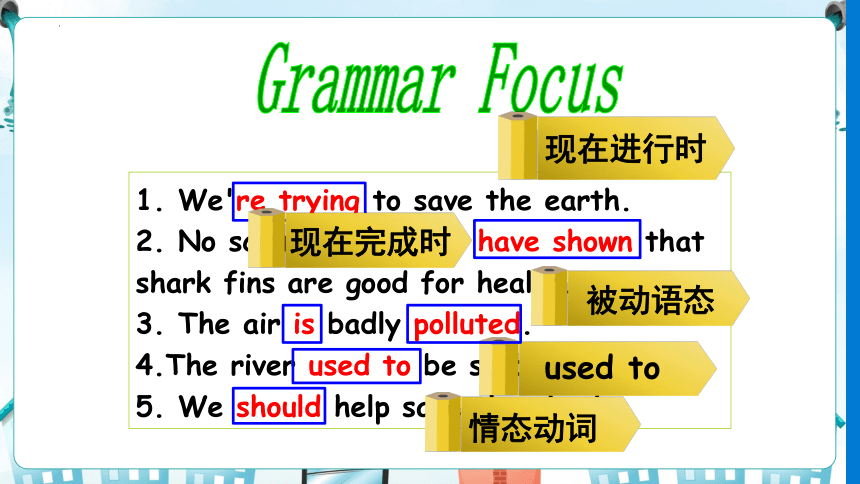
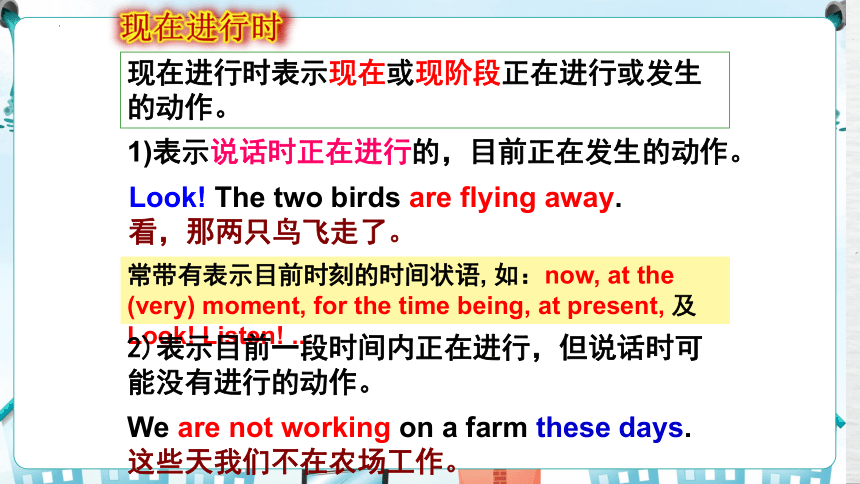
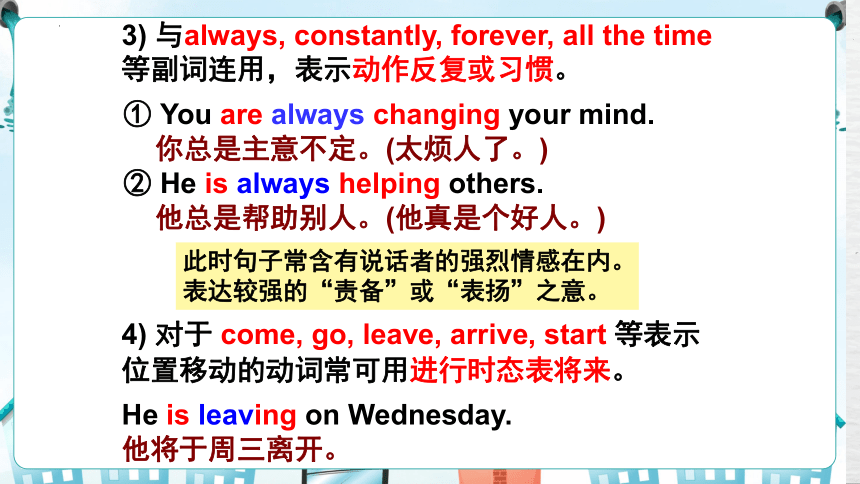
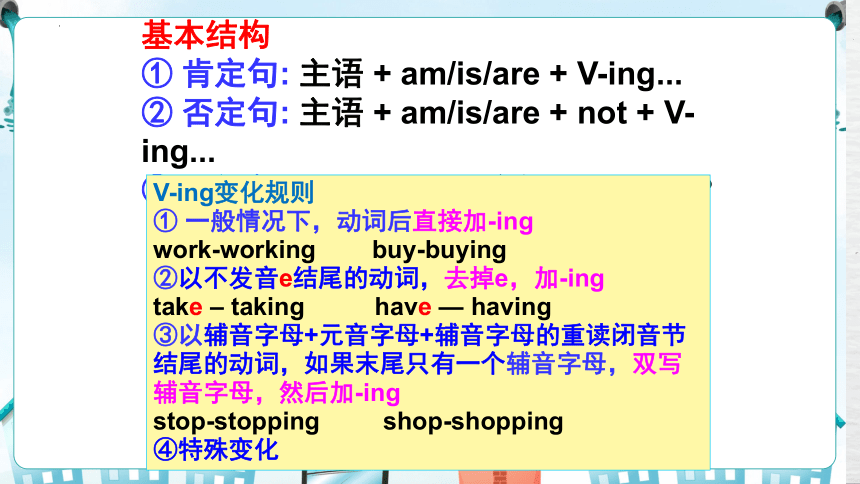
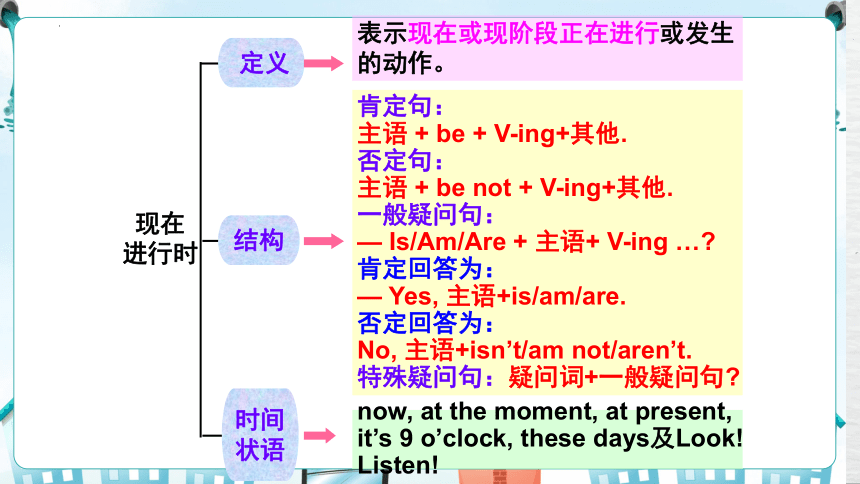
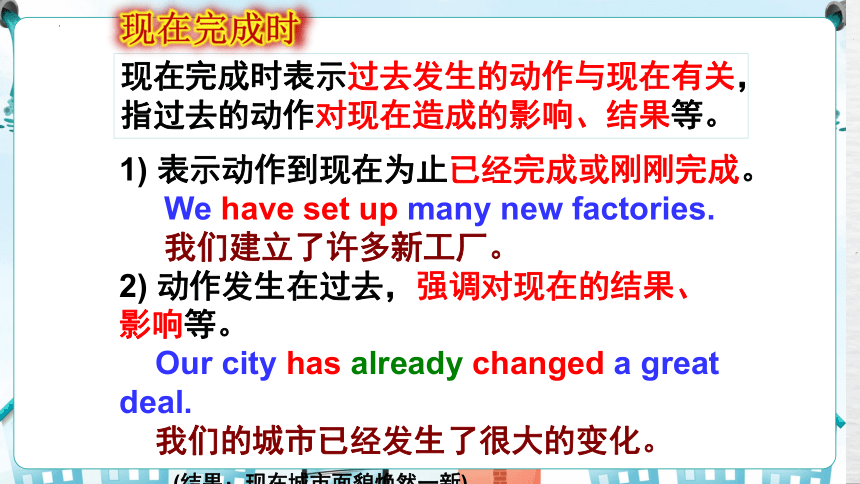

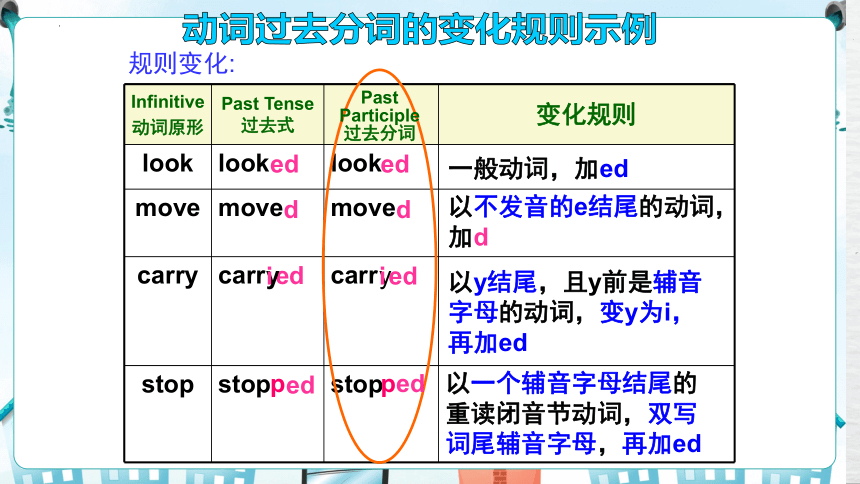
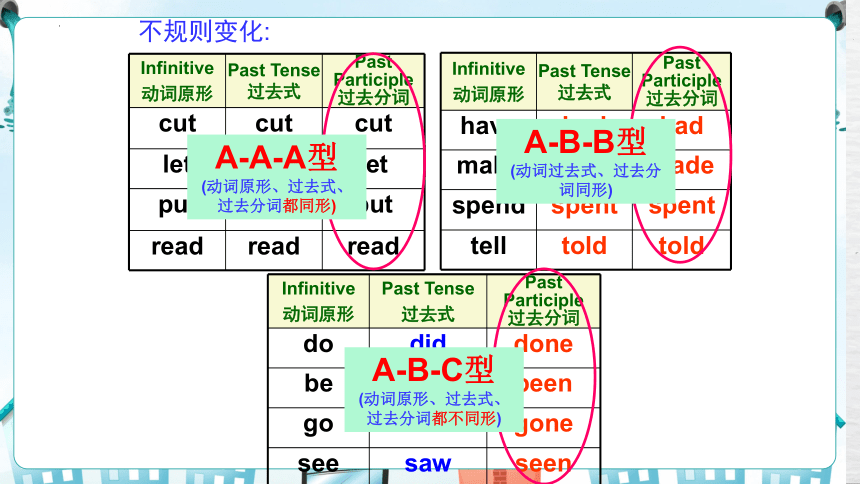
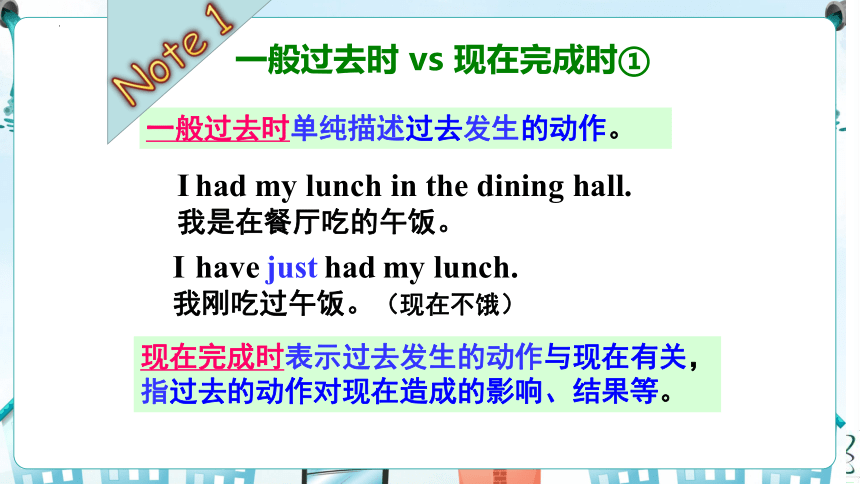
文档简介
(共52张PPT)
Unit 13
We're trying to save the earth!
时态复习讲练
现在进行时:表示
说话时正在进行的,
目前正在发生的动作。
现在进行时
现在完成时
情态动词用来表示能力、应该、请求等, 后接动词原形。
被动语态
被动语态表示主语是谓语动作的承受者。
used to 意为“过去常常”,表示过去习惯性的动作或常常存在的状态。
情态动词
Pay attention to the circled parts.
现在完成时:表示过去发生的动作与现在有关,指过去的动作对现在造成的影响、结果等。
1. We're trying to save the earth.
2. No scientific studies have shown that shark fins are good for health.
3. The air is badly polluted.
4.The river used to be so clean.
5. We should help save the sharks.
Grammar Focus
现在进行时
used to
被动语态
现在完成时
情态动词
现在进行时表示现在或现阶段正在进行或发生的动作。
Look! The two birds are flying away.
看,那两只鸟飞走了。
表示说话时正在进行的,目前正在发生的动作。
常带有表示目前时刻的时间状语, 如:now, at the (very) moment, for the time being, at present, 及Look! Listen! ...
We are not working on a farm these days.
这些天我们不在农场工作。
2)表示目前一段时间内正在进行,但说话时可能没有进行的动作。
现在进行时
① You are always changing your mind.
你总是主意不定。(太烦人了。)
② He is always helping others.
他总是帮助别人。(他真是个好人。)
He is leaving on Wednesday.
他将于周三离开。
3) 与always, constantly, forever, all the time等副词连用,表示动作反复或习惯。
此时句子常含有说话者的强烈情感在内。表达较强的“责备”或“表扬”之意。
4) 对于 come, go, leave, arrive, start 等表示位置移动的动词常可用进行时态表将来。
基本结构
① 肯定句: 主语 + am/is/are + V-ing...
② 否定句: 主语 + am/is/are + not + V-ing...
③ 疑问句: Am/Is/Are + 主语 + V-ing...
V-ing变化规则
① 一般情况下,动词后直接加-ing
work-working buy-buying
②以不发音e结尾的动词,去掉e,加-ing
take – taking have — having
③以辅音字母+元音字母+辅音字母的重读闭音节结尾的动词,如果末尾只有一个辅音字母,双写辅音字母,然后加-ing
stop-stopping shop-shopping
④特殊变化
表示现在或现阶段正在进行或发生的动作。
now, at the moment, at present, it’s 9 o’clock, these days及Look! Listen!
现在
进行时
肯定句:
主语 + be + V-ing+其他.
否定句:
主语 + be not + V-ing+其他.
一般疑问句:
— Is/Am/Are + 主语+ V-ing …
肯定回答为:
— Yes, 主语+is/am/are.
否定回答为:
No, 主语+isn’t/am not/aren’t.
特殊疑问句:疑问词+一般疑问句
结构
定义
时间状语
1) 表示动作到现在为止已经完成或刚刚完成。
We have set up many new factories.
我们建立了许多新工厂。
2) 动作发生在过去,强调对现在的结果、 影响等。
Our city has already changed a great deal.
我们的城市已经发生了很大的变化。
(结果:现在城市面貌焕然一新)
现在完成时表示过去发生的动作与现在有关,指过去的动作对现在造成的影响、结果等。
现在完成时
3) 表示动作发生在过去,并且一直持续到现在,甚至还可能继续下去,句中使用持续性动词,且常有表示一段时间的时间状语。
① We haven't seen each other for ten years.
我们已经十年没见面了。
② I've been an English teacher for about 20 years.
我当英语老师已经20年了。
规则变化:
动词过去分词的变化规则示例
Infinitive 动词原形 Past Tense 过去式 变化规则
look look look
move move move
carry carr carr
stop stop stop
ed
ed
d
d
ed
ed
ed
ed
Past Participle
过去分词
一般动词,加ed
以不发音的e结尾的动词,加d
以y结尾,且y前是辅音字母的动词,变y为i,再加ed
以一个辅音字母结尾的重读闭音节动词,双写词尾辅音字母,再加ed
y
i
y
i
p
p
Infinitive 动词原形 Past Tense 过去式 Past Participle
过去分词
cut cut cut
let let let
put put put
read read read
Infinitive 动词原形 Past Tense 过去式 Past Participle
过去分词
have had had
make made made
spend spent spent
tell told told
Infinitive 动词原形 Past Tense 过去式 Past Participle
过去分词
do did done
be was/were been
go went gone
see saw seen
不规则变化:
A-A-A型
(动词原形、过去式、过去分词都同形)
A-B-B型
(动词过去式、过去分词同形)
A-B-C型
(动词原形、过去式、过去分词都不同形)
I just my lunch.
我刚吃过午饭。(现在不饿)
一般过去时 vs 现在完成时①
I my lunch in the dining hall.
我是在餐厅吃的午饭。
一般过去时单纯描述过去发生的动作。
现在完成时表示过去发生的动作与现在有关,指过去的动作对现在造成的影响、结果等。
had
have had
Note 1
他离开上海已经3天了。
He has left Shanghai for three days.
He Shanghai for three days.
It three days since he left Shanghai.
Three days since he left Shanghai.
He Shanghai three days ago.
has been away from
is/has been
has passed
left
一般过去时 vs 现在完成时②
Note 2
短暂性动词的肯定式不能与表示一段
时间的for或since或how long等状语连用.
短暂性动词
现在完成时表示过去发生的动作与现在有关,指过去的动作对现在造成的影响、结果等。
already, yet, for+时间段, since+时间点
现在完成时
肯定句:
主语 + have/has + V-ed + 其他.
否定句:
主语 + haven't/hasn't + V-ed + 其他.
一般疑问句:
Have/Has + 主语 + V-ed + …?
肯定答语:
Yes, 主格代词 + have/has.
否定答语:
No, 主格代词 + haven't/hasn't.
特殊疑问句:
特殊疑问词+一般疑问句
结构
定义
标志词
被动语态表示主语是谓语动作的承受者,被动语态由“be + V-ed”构成。be随着主语人称和数以及时态的不同而变化。
It was made in Germany in 1681.
它于1681年在德国制造。
1. 不知道或没必要指出动作的执行者。
Chinese is spoken by more and more people in the
world.
世界上越来越多的人说中文了。
2.强调动作的承受者。
被动语态
3. 动作的执行者有较长的修饰语。
The plan was supported by those who wished to have more chances to speak English.
该计划得到了那些希望有更多机会讲英语的人的支持。
4. 出于礼貌,不愿意说出动作执行者。
1) You are requested to attend the meeting.
请你参加会议。
2) I was told that you were not honest enough.
有人告诉我你不够诚实。
被动语态表示主语是谓语动作的承受者
谓语动词 be (not) + done (V-ed)
被动
语态
肯定句:
主语 + be + V-ed (+ by…).
否定句:
主语 + be + not + V-ed (+by…).
一般疑问句:
Be + 主语 + V-ed (+by…)
特殊疑问句:
疑问词 + be + 主语 + V-ed (+by…)
结构
定义
构成
时态 主动语态
一般现在时 do/does
一般过去时 did
一般将来时 will/shall/be going to + do
现在完成时 have/has done
现在进行时 am/is/are doing
过去进行时 was/were doing
被动语态
am/is/are + done
was/were + done
will/shall/be going to + be + done
have/has + been done
am/is/are + being done
was/were + being done
used to,“过去常常”,后面接动词原形,用来表示过去曾经的习惯或常有的行为而现在不再有,强调过去和现在的对比。
used to
构成
肯定句:
used to + 动词原形
否定句:
主语 + didn't use to…
一般疑问句:
Did+主语+use to do sth.
情态动词用来表示能力、应该、请求、推测等, 后接动词原形。情态动词(除have to以外)没有人称和数的变化。
情态动词
1.表示“能力”的情态动词。
1) — ________ your Australian friend eat with chopsticks
— Yes, but she can’t use them well.
A. Should B. Need C. Can D. Must
2) — Could your father play golf when he was young
— No, he ________. But he ________ play table tennis.
A. couldn’t; could B. needn’t; might
C. mustn’t; should D. shouldn’t; need
【考点点拨】
★情态动词can表示“能力”时,与be able to同义,其否定形式为can’t。can表示现在的能力,其过去式could表示过去的能力。
2.表示“应该”的情态动词。
1) — ________ we to finish our homework before noon
— Yes, you ________.
A. Need; can B. Have; do
C. Ought; ought to D. Should; must
2) You ________ study hard if you want to
be a scientist in the future.
A. may B. should
C. would D. could
【考点点拨】
★情态动词should和ought to都可表示
“应该”,但should侧重说话者主观的看法,而ought to更侧重客观情况。
★should的否定形式为shouldn’t,ought to的否定形式为oughtn’t to或ought not to。
1) — ________ I borrow your maths book
— Sure. Here you are.
A. Need B. Will
C. May D. Must
2) — Could I use your dictionary for a while
— Yes, of course you ________.
A. could B. can
C. will D. should
3.表示“请求;许可”的情态动词及其回答。
【考点点拨】
★情态动词may和can都可表示“请求;
许可”。may比can正式,could在表示“请求;许可” 时,语气更委婉。
★当“May / Can / Could I …”表示“请求;许可”时,肯定回答常用“Yes, please.” / “Certainly.”等,否定回答常用“No, you can’t / mustn’t.”等。
4. 考查表示“推测”的情态动词。
1) — I saw Lily in the supermarket this
morning.
— Oh, it ________ her. She moved to
Australia the day before yesterday.
A. can be B. must be
C. can’t be D. mustn’t be
2) After a long walk, the children ________
be very tired now.
A. will B. must
C. have to D. can
3) John ________ go with us tomorrow, but
he isn’t sure.
A. must B. can
C. need D. may
【考点点拨】
★may, can, must都可表“推测”,三者
的可能性依次递增。
★may和must表“推测”常用于肯定句中,can表“推测”常用于否定句和疑问句中。
5.考查need, must和have to的用法。
1) Jim, you ________ play with the knife.
You ________ hurt yourself.
A. won’t; can’t B. mustn’t; may
C. shouldn’t; must D. can’t; shouldn’t
2) — ________ I have to hand in my
homework now, Mr Zhang
— Yes, you do.
A. Do B. Can
C. May D. Must
3) — Must I get up before six o’clock
tomorrow morning, Dad
— No, you ________. Tomorrow is
Saturday. You may get up a little later.
A. mustn’t B. can’t
C. needn’t D. may not
4) It’s too late. We ________ go home, or
we’ll be blamed (责备).
A. can B. may
C. might D. have to
1. You are not allowed to play with fire in the forest. It ____ kill plants, animals and even people.
A. might B. might not
C. should D. should not (2020 昆明)
2. —Allen, shall we go to the bookstore this afternoon
—I’m sorry. David, but I ____ meet my cousin at the train station.
A. have to B. can C. may D. could (2020 青岛)
A
情态动词
A
3. According to the traffic law, children under 12 _____ ride bicycles on the road.
A. won’t B. wouldn’t C. needn’t D. mustn’t
(2020 上海)
4. I _____ be late, so don’t wait for me to start the meeting.
A. mustn’t B. needn’t C. need D. may
(2020 天津)
D
D
1. —Could you play the piano at the age of five
—No, I ______. I started at six. (2021江苏常州)
A. can’t B. shouldn’t C. needn’t D. couldn’t
2. —Must I return this book before Friday, Sir
—No, you ________, dear. You can keep it for two weeks.
(2021 江苏南通)
A. can’t B. shouldn’t C. mustn’t D. needn’t
D
情态动词
D
3. —How long can I keep these books
—According to the library rules, you ________ return them within 7 days. (2021海南)
A. must B. might C. could
4. —You ________ take photos here! Look at the sign. It says “No photos”.
—Sorry, I won’t. (2021云南)
A. must B. need C. mustn’t D. needn’t
A
C
1. Since 1989, Project Hope _____ millions of young people from poor families achieve their dreams of going to school.
A. will help B. helps
C. has helped D. is helping (2020 昆明)
2. —Be quick, Sara! The taxi is waiting for us outside.
—A moment, please. I _____ some visitors our products.
A. showed B. am showing
C. was showing D. show (2020 营口)
C
B
现在进行时
现在完成时
&
3. —It’s 20 years since we came back to Liangshan.
—How time flies! We___ in our hometown for such a long time.
A. Work B. worked
C. has worked D. have worked (2020 凉山)
4. —Our city, Shaoyang, is getting cleaner and cleaner day by day.
—Yeah. We ___ a national modern, civilized hygiene (文明卫生) city.
A. create B. are creating C. created
(2020 邵阳)
D
B
1. I joined the book club last month and I ______ five books already. (2021贵州毕节)
A. am reading B. have read C. will read D. read
2. —Miss Zhang seems quite familiar with Yunnan Province.
—Don’t you know She _______ a town school there as a volunteer teacher for over 2 years. (2021 江苏南通)
A. is in B. has gone to
C. has been in D. has been to
B
C
现在进行时
现在完成时
&
3. Look! Some old people ________ in the park. (2021广西桂林)
A. sings B. sing C. are singing
4. —Don’t make noise! The children ________online.
—Sorry, I won’t. (2021四川凉山)
A. studies B. are studying
C. studied D. were studying
5. —Peter, what are you doing
—Oh, I ________ a report about national heroes. (2021 北京)
A. will write B. am writing
C. wrote D. have written
C
B
B
1. How delicious the cake is! It ____ by my grandmother this morning.
A. made B. is made C. was made
(2020 吉林)
2. —Mr. White, when shall I hand in my report
—As soon as it ____ tomorrow.
A. finishes B. will finish
C. will be finished D. is finished (2020 鄂州)
C
D
被动语态
3. Many successful businessmen ____ to Hainan to give advice on how to build Hainan Free Trade Port.
A. invite B. are invited C. are inviting
(2020 海南)
4. —Your hometown is famous for tea, right
—Yes. Now tea plants ____ on most mountains here.
A. will grow B. are grown C. were grown
(2020 福建)
B
B
1. Our school library ________ with plants, lovely desks and chairs, so I feel relaxed while studying or reading there. (2021江苏南京)
decorates B. decorated
C. is decorated D. was decorating
2. — Why do some whales have to _________
— Because humans catch whales for meat, fat and oil. Some of them are _________. (2021四川达州)
A.protect; dangerous B.protect; endangered
C.be protected; dangerous D.be protected; endangered
C
D
被动语态
3. A lot of teenagers think as they are older and wiser, they ________ to make their own decisions. (2021云南昆明)
A. should allow B. shouldn’t allow
C. should be allowed D. shouldn’t be allowed
4. The blender ________ for making a banana milk shake just now. (2021湖南岳阳)
A. will be used B. was used C. is used
5. Many research labs ________ in the next 5 years to develop science and technology in China. (2021福建)
A. are building B. will be built C. were built
C
B
B
used to
1. —Tom _______ every day.
—Really But why is he so weak now (2021青海)
used to exercise B. is used to exercising
C. used to stay up late
2. I ________ sleep very well, but then I started doing yoga and it really helps. (2020甘肃武威)
didn’t use to B. used to
C. was used to D. wasn’t used to
A
A
4a
Fill in the blanks with the correct forms of the verbs in brackets.
Joe: ______ you ever ______ (take) part in an environmental project
Eric: Yes, I have. I ________ (help) with a Clean-Up Day last year. It was ___________ (consider) the biggest clean-up project this city ______ ever ______ (have).
Have
taken
helped
considered
had
had
Joe: How many people _____ (take) part
Eric: I _____ (think) more than 1,000 people ______ (come) to help out.
Joe: That’s fantastic! I guess everyone in this city is _______ (try) to improve the environment.
Eric: Yes, we can’t afford to _____ (wait) any longer to take action!
took
think
came
trying
wait
4b
Fill in the blanks with the appropriate modal verbs from the box.
People __________ think that big things ____________ be done to save the earth. Many forget that saving the earth begins with small things. For example, you __________________ save electricity by turning off the lights when you leave a room. You _________________ also use reusable bags instead of plastic bags.
may/might
must/have to
can, would, could, have to, should, must, may / might
can/could/should
can/could/should
I think it’s a great idea that you now ________ pay for plastic bags in some stores. And instead of driving to school or work, you ________________ ride your bike or walk. If it’s far, you _________ take the bus. All these small things __________ add up and become big things that _______________ improve the environment. Let’s take action now!
have to
can/could/should
can/could
can, would, could, have to, should, must, may / might
can/could
can/could/would
4c
Make a list of things that people can do to help the environment and discuss your list with your partner.
use public transportation (n.交通运输)
turn off the lights when you leave a room
use reusable bags instead of plastic bags
ride your bike or walk to school or work
stop using paper napkins (n. 餐巾纸)
recycle books and paper…
We can’t afford to wait any longer to take action!
我们承担不起继续等待而不采取行动!
afford v. 承担得起; 买得起; 提供, 给予
常与can, be able to等连用, 多用于否定句或疑问句。
afford sth. 买得起 / 承受得起某物
afford to do sth. 有能力做某事 / 负担得起做某事
e.g. Can you afford the mobile phone
We can’t afford to pay such a price.
afford & buy
afford 侧重“有经济能力买”
buy 侧重“购买(这一行为)”
【语境应用】用afford或buy的 适当形式填空。
1) They can’t ________ to send their children to college.
2) Can you ________ a new car
3) Helen ________ some fruit on her way home yesterday.
afford
afford
bought
I. 根据句意,从方框中选择恰当的情态动词填空(有的答案不 唯一,可重复选择)。
can, could, may, might, mustn’t, should, would, not have to
1. My cousin is good at swimming. She _____________ swim when she was 6 years old.
2. You _____________ park your car here. Look at the “No Parking” sign.
3. If you stay up too late, you ____________ feel tired all day.
could
mustn’t
may/might
can, could, may, might, mustn’t, should, would, not have to
4. Wendy is happy that she _______________ get up very early tomorrow morning.
5. To practice speaking English, I think you ______________ join an English club.
6. _______________ you please drive more quickly My train will leave in an hour.
won’t have to
should/could/can
Would/Could/Can
II. 根据语境,从方框中选择恰当的词语填空,注意形式变化。
visit, clean, not finish, sing, smoke, plant, take place, not listen to
1. Listen! Somebody _______________ in the next room. What a sweet voice!
2. Those beautiful flowers _______________ last year.
3. They _______________ the English teacher carefully. They’ re talking!
4. —The meeting room is very tidy.
—Yes. It _______________ every day.
is singing
were planted
aren’t listening to
is cleaned
visit, clean, not finish, sing, smoke, plant, take place, not listen to
5. —Would you like to visit that new museum with me next Saturday
—I’ d love to, but I _______________ it already.
6. He used to _______________ a lot, but now to keep healthy he has given it up.
7. Greg _______________ his math homework yet. It’ s a little difficult for him.
8. In the past five years, great changes _______________ in my hometown.
have visited
smoke
hasn’t finished
have taken place
Make up a conversation about what people can do to protect the environment by using modal verbs.
Unit 13
We're trying to save the earth!
时态复习讲练
现在进行时:表示
说话时正在进行的,
目前正在发生的动作。
现在进行时
现在完成时
情态动词用来表示能力、应该、请求等, 后接动词原形。
被动语态
被动语态表示主语是谓语动作的承受者。
used to 意为“过去常常”,表示过去习惯性的动作或常常存在的状态。
情态动词
Pay attention to the circled parts.
现在完成时:表示过去发生的动作与现在有关,指过去的动作对现在造成的影响、结果等。
1. We're trying to save the earth.
2. No scientific studies have shown that shark fins are good for health.
3. The air is badly polluted.
4.The river used to be so clean.
5. We should help save the sharks.
Grammar Focus
现在进行时
used to
被动语态
现在完成时
情态动词
现在进行时表示现在或现阶段正在进行或发生的动作。
Look! The two birds are flying away.
看,那两只鸟飞走了。
表示说话时正在进行的,目前正在发生的动作。
常带有表示目前时刻的时间状语, 如:now, at the (very) moment, for the time being, at present, 及Look! Listen! ...
We are not working on a farm these days.
这些天我们不在农场工作。
2)表示目前一段时间内正在进行,但说话时可能没有进行的动作。
现在进行时
① You are always changing your mind.
你总是主意不定。(太烦人了。)
② He is always helping others.
他总是帮助别人。(他真是个好人。)
He is leaving on Wednesday.
他将于周三离开。
3) 与always, constantly, forever, all the time等副词连用,表示动作反复或习惯。
此时句子常含有说话者的强烈情感在内。表达较强的“责备”或“表扬”之意。
4) 对于 come, go, leave, arrive, start 等表示位置移动的动词常可用进行时态表将来。
基本结构
① 肯定句: 主语 + am/is/are + V-ing...
② 否定句: 主语 + am/is/are + not + V-ing...
③ 疑问句: Am/Is/Are + 主语 + V-ing...
V-ing变化规则
① 一般情况下,动词后直接加-ing
work-working buy-buying
②以不发音e结尾的动词,去掉e,加-ing
take – taking have — having
③以辅音字母+元音字母+辅音字母的重读闭音节结尾的动词,如果末尾只有一个辅音字母,双写辅音字母,然后加-ing
stop-stopping shop-shopping
④特殊变化
表示现在或现阶段正在进行或发生的动作。
now, at the moment, at present, it’s 9 o’clock, these days及Look! Listen!
现在
进行时
肯定句:
主语 + be + V-ing+其他.
否定句:
主语 + be not + V-ing+其他.
一般疑问句:
— Is/Am/Are + 主语+ V-ing …
肯定回答为:
— Yes, 主语+is/am/are.
否定回答为:
No, 主语+isn’t/am not/aren’t.
特殊疑问句:疑问词+一般疑问句
结构
定义
时间状语
1) 表示动作到现在为止已经完成或刚刚完成。
We have set up many new factories.
我们建立了许多新工厂。
2) 动作发生在过去,强调对现在的结果、 影响等。
Our city has already changed a great deal.
我们的城市已经发生了很大的变化。
(结果:现在城市面貌焕然一新)
现在完成时表示过去发生的动作与现在有关,指过去的动作对现在造成的影响、结果等。
现在完成时
3) 表示动作发生在过去,并且一直持续到现在,甚至还可能继续下去,句中使用持续性动词,且常有表示一段时间的时间状语。
① We haven't seen each other for ten years.
我们已经十年没见面了。
② I've been an English teacher for about 20 years.
我当英语老师已经20年了。
规则变化:
动词过去分词的变化规则示例
Infinitive 动词原形 Past Tense 过去式 变化规则
look look look
move move move
carry carr carr
stop stop stop
ed
ed
d
d
ed
ed
ed
ed
Past Participle
过去分词
一般动词,加ed
以不发音的e结尾的动词,加d
以y结尾,且y前是辅音字母的动词,变y为i,再加ed
以一个辅音字母结尾的重读闭音节动词,双写词尾辅音字母,再加ed
y
i
y
i
p
p
Infinitive 动词原形 Past Tense 过去式 Past Participle
过去分词
cut cut cut
let let let
put put put
read read read
Infinitive 动词原形 Past Tense 过去式 Past Participle
过去分词
have had had
make made made
spend spent spent
tell told told
Infinitive 动词原形 Past Tense 过去式 Past Participle
过去分词
do did done
be was/were been
go went gone
see saw seen
不规则变化:
A-A-A型
(动词原形、过去式、过去分词都同形)
A-B-B型
(动词过去式、过去分词同形)
A-B-C型
(动词原形、过去式、过去分词都不同形)
I just my lunch.
我刚吃过午饭。(现在不饿)
一般过去时 vs 现在完成时①
I my lunch in the dining hall.
我是在餐厅吃的午饭。
一般过去时单纯描述过去发生的动作。
现在完成时表示过去发生的动作与现在有关,指过去的动作对现在造成的影响、结果等。
had
have had
Note 1
他离开上海已经3天了。
He has left Shanghai for three days.
He Shanghai for three days.
It three days since he left Shanghai.
Three days since he left Shanghai.
He Shanghai three days ago.
has been away from
is/has been
has passed
left
一般过去时 vs 现在完成时②
Note 2
短暂性动词的肯定式不能与表示一段
时间的for或since或how long等状语连用.
短暂性动词
现在完成时表示过去发生的动作与现在有关,指过去的动作对现在造成的影响、结果等。
already, yet, for+时间段, since+时间点
现在完成时
肯定句:
主语 + have/has + V-ed + 其他.
否定句:
主语 + haven't/hasn't + V-ed + 其他.
一般疑问句:
Have/Has + 主语 + V-ed + …?
肯定答语:
Yes, 主格代词 + have/has.
否定答语:
No, 主格代词 + haven't/hasn't.
特殊疑问句:
特殊疑问词+一般疑问句
结构
定义
标志词
被动语态表示主语是谓语动作的承受者,被动语态由“be + V-ed”构成。be随着主语人称和数以及时态的不同而变化。
It was made in Germany in 1681.
它于1681年在德国制造。
1. 不知道或没必要指出动作的执行者。
Chinese is spoken by more and more people in the
world.
世界上越来越多的人说中文了。
2.强调动作的承受者。
被动语态
3. 动作的执行者有较长的修饰语。
The plan was supported by those who wished to have more chances to speak English.
该计划得到了那些希望有更多机会讲英语的人的支持。
4. 出于礼貌,不愿意说出动作执行者。
1) You are requested to attend the meeting.
请你参加会议。
2) I was told that you were not honest enough.
有人告诉我你不够诚实。
被动语态表示主语是谓语动作的承受者
谓语动词 be (not) + done (V-ed)
被动
语态
肯定句:
主语 + be + V-ed (+ by…).
否定句:
主语 + be + not + V-ed (+by…).
一般疑问句:
Be + 主语 + V-ed (+by…)
特殊疑问句:
疑问词 + be + 主语 + V-ed (+by…)
结构
定义
构成
时态 主动语态
一般现在时 do/does
一般过去时 did
一般将来时 will/shall/be going to + do
现在完成时 have/has done
现在进行时 am/is/are doing
过去进行时 was/were doing
被动语态
am/is/are + done
was/were + done
will/shall/be going to + be + done
have/has + been done
am/is/are + being done
was/were + being done
used to,“过去常常”,后面接动词原形,用来表示过去曾经的习惯或常有的行为而现在不再有,强调过去和现在的对比。
used to
构成
肯定句:
used to + 动词原形
否定句:
主语 + didn't use to…
一般疑问句:
Did+主语+use to do sth.
情态动词用来表示能力、应该、请求、推测等, 后接动词原形。情态动词(除have to以外)没有人称和数的变化。
情态动词
1.表示“能力”的情态动词。
1) — ________ your Australian friend eat with chopsticks
— Yes, but she can’t use them well.
A. Should B. Need C. Can D. Must
2) — Could your father play golf when he was young
— No, he ________. But he ________ play table tennis.
A. couldn’t; could B. needn’t; might
C. mustn’t; should D. shouldn’t; need
【考点点拨】
★情态动词can表示“能力”时,与be able to同义,其否定形式为can’t。can表示现在的能力,其过去式could表示过去的能力。
2.表示“应该”的情态动词。
1) — ________ we to finish our homework before noon
— Yes, you ________.
A. Need; can B. Have; do
C. Ought; ought to D. Should; must
2) You ________ study hard if you want to
be a scientist in the future.
A. may B. should
C. would D. could
【考点点拨】
★情态动词should和ought to都可表示
“应该”,但should侧重说话者主观的看法,而ought to更侧重客观情况。
★should的否定形式为shouldn’t,ought to的否定形式为oughtn’t to或ought not to。
1) — ________ I borrow your maths book
— Sure. Here you are.
A. Need B. Will
C. May D. Must
2) — Could I use your dictionary for a while
— Yes, of course you ________.
A. could B. can
C. will D. should
3.表示“请求;许可”的情态动词及其回答。
【考点点拨】
★情态动词may和can都可表示“请求;
许可”。may比can正式,could在表示“请求;许可” 时,语气更委婉。
★当“May / Can / Could I …”表示“请求;许可”时,肯定回答常用“Yes, please.” / “Certainly.”等,否定回答常用“No, you can’t / mustn’t.”等。
4. 考查表示“推测”的情态动词。
1) — I saw Lily in the supermarket this
morning.
— Oh, it ________ her. She moved to
Australia the day before yesterday.
A. can be B. must be
C. can’t be D. mustn’t be
2) After a long walk, the children ________
be very tired now.
A. will B. must
C. have to D. can
3) John ________ go with us tomorrow, but
he isn’t sure.
A. must B. can
C. need D. may
【考点点拨】
★may, can, must都可表“推测”,三者
的可能性依次递增。
★may和must表“推测”常用于肯定句中,can表“推测”常用于否定句和疑问句中。
5.考查need, must和have to的用法。
1) Jim, you ________ play with the knife.
You ________ hurt yourself.
A. won’t; can’t B. mustn’t; may
C. shouldn’t; must D. can’t; shouldn’t
2) — ________ I have to hand in my
homework now, Mr Zhang
— Yes, you do.
A. Do B. Can
C. May D. Must
3) — Must I get up before six o’clock
tomorrow morning, Dad
— No, you ________. Tomorrow is
Saturday. You may get up a little later.
A. mustn’t B. can’t
C. needn’t D. may not
4) It’s too late. We ________ go home, or
we’ll be blamed (责备).
A. can B. may
C. might D. have to
1. You are not allowed to play with fire in the forest. It ____ kill plants, animals and even people.
A. might B. might not
C. should D. should not (2020 昆明)
2. —Allen, shall we go to the bookstore this afternoon
—I’m sorry. David, but I ____ meet my cousin at the train station.
A. have to B. can C. may D. could (2020 青岛)
A
情态动词
A
3. According to the traffic law, children under 12 _____ ride bicycles on the road.
A. won’t B. wouldn’t C. needn’t D. mustn’t
(2020 上海)
4. I _____ be late, so don’t wait for me to start the meeting.
A. mustn’t B. needn’t C. need D. may
(2020 天津)
D
D
1. —Could you play the piano at the age of five
—No, I ______. I started at six. (2021江苏常州)
A. can’t B. shouldn’t C. needn’t D. couldn’t
2. —Must I return this book before Friday, Sir
—No, you ________, dear. You can keep it for two weeks.
(2021 江苏南通)
A. can’t B. shouldn’t C. mustn’t D. needn’t
D
情态动词
D
3. —How long can I keep these books
—According to the library rules, you ________ return them within 7 days. (2021海南)
A. must B. might C. could
4. —You ________ take photos here! Look at the sign. It says “No photos”.
—Sorry, I won’t. (2021云南)
A. must B. need C. mustn’t D. needn’t
A
C
1. Since 1989, Project Hope _____ millions of young people from poor families achieve their dreams of going to school.
A. will help B. helps
C. has helped D. is helping (2020 昆明)
2. —Be quick, Sara! The taxi is waiting for us outside.
—A moment, please. I _____ some visitors our products.
A. showed B. am showing
C. was showing D. show (2020 营口)
C
B
现在进行时
现在完成时
&
3. —It’s 20 years since we came back to Liangshan.
—How time flies! We___ in our hometown for such a long time.
A. Work B. worked
C. has worked D. have worked (2020 凉山)
4. —Our city, Shaoyang, is getting cleaner and cleaner day by day.
—Yeah. We ___ a national modern, civilized hygiene (文明卫生) city.
A. create B. are creating C. created
(2020 邵阳)
D
B
1. I joined the book club last month and I ______ five books already. (2021贵州毕节)
A. am reading B. have read C. will read D. read
2. —Miss Zhang seems quite familiar with Yunnan Province.
—Don’t you know She _______ a town school there as a volunteer teacher for over 2 years. (2021 江苏南通)
A. is in B. has gone to
C. has been in D. has been to
B
C
现在进行时
现在完成时
&
3. Look! Some old people ________ in the park. (2021广西桂林)
A. sings B. sing C. are singing
4. —Don’t make noise! The children ________online.
—Sorry, I won’t. (2021四川凉山)
A. studies B. are studying
C. studied D. were studying
5. —Peter, what are you doing
—Oh, I ________ a report about national heroes. (2021 北京)
A. will write B. am writing
C. wrote D. have written
C
B
B
1. How delicious the cake is! It ____ by my grandmother this morning.
A. made B. is made C. was made
(2020 吉林)
2. —Mr. White, when shall I hand in my report
—As soon as it ____ tomorrow.
A. finishes B. will finish
C. will be finished D. is finished (2020 鄂州)
C
D
被动语态
3. Many successful businessmen ____ to Hainan to give advice on how to build Hainan Free Trade Port.
A. invite B. are invited C. are inviting
(2020 海南)
4. —Your hometown is famous for tea, right
—Yes. Now tea plants ____ on most mountains here.
A. will grow B. are grown C. were grown
(2020 福建)
B
B
1. Our school library ________ with plants, lovely desks and chairs, so I feel relaxed while studying or reading there. (2021江苏南京)
decorates B. decorated
C. is decorated D. was decorating
2. — Why do some whales have to _________
— Because humans catch whales for meat, fat and oil. Some of them are _________. (2021四川达州)
A.protect; dangerous B.protect; endangered
C.be protected; dangerous D.be protected; endangered
C
D
被动语态
3. A lot of teenagers think as they are older and wiser, they ________ to make their own decisions. (2021云南昆明)
A. should allow B. shouldn’t allow
C. should be allowed D. shouldn’t be allowed
4. The blender ________ for making a banana milk shake just now. (2021湖南岳阳)
A. will be used B. was used C. is used
5. Many research labs ________ in the next 5 years to develop science and technology in China. (2021福建)
A. are building B. will be built C. were built
C
B
B
used to
1. —Tom _______ every day.
—Really But why is he so weak now (2021青海)
used to exercise B. is used to exercising
C. used to stay up late
2. I ________ sleep very well, but then I started doing yoga and it really helps. (2020甘肃武威)
didn’t use to B. used to
C. was used to D. wasn’t used to
A
A
4a
Fill in the blanks with the correct forms of the verbs in brackets.
Joe: ______ you ever ______ (take) part in an environmental project
Eric: Yes, I have. I ________ (help) with a Clean-Up Day last year. It was ___________ (consider) the biggest clean-up project this city ______ ever ______ (have).
Have
taken
helped
considered
had
had
Joe: How many people _____ (take) part
Eric: I _____ (think) more than 1,000 people ______ (come) to help out.
Joe: That’s fantastic! I guess everyone in this city is _______ (try) to improve the environment.
Eric: Yes, we can’t afford to _____ (wait) any longer to take action!
took
think
came
trying
wait
4b
Fill in the blanks with the appropriate modal verbs from the box.
People __________ think that big things ____________ be done to save the earth. Many forget that saving the earth begins with small things. For example, you __________________ save electricity by turning off the lights when you leave a room. You _________________ also use reusable bags instead of plastic bags.
may/might
must/have to
can, would, could, have to, should, must, may / might
can/could/should
can/could/should
I think it’s a great idea that you now ________ pay for plastic bags in some stores. And instead of driving to school or work, you ________________ ride your bike or walk. If it’s far, you _________ take the bus. All these small things __________ add up and become big things that _______________ improve the environment. Let’s take action now!
have to
can/could/should
can/could
can, would, could, have to, should, must, may / might
can/could
can/could/would
4c
Make a list of things that people can do to help the environment and discuss your list with your partner.
use public transportation (n.交通运输)
turn off the lights when you leave a room
use reusable bags instead of plastic bags
ride your bike or walk to school or work
stop using paper napkins (n. 餐巾纸)
recycle books and paper…
We can’t afford to wait any longer to take action!
我们承担不起继续等待而不采取行动!
afford v. 承担得起; 买得起; 提供, 给予
常与can, be able to等连用, 多用于否定句或疑问句。
afford sth. 买得起 / 承受得起某物
afford to do sth. 有能力做某事 / 负担得起做某事
e.g. Can you afford the mobile phone
We can’t afford to pay such a price.
afford & buy
afford 侧重“有经济能力买”
buy 侧重“购买(这一行为)”
【语境应用】用afford或buy的 适当形式填空。
1) They can’t ________ to send their children to college.
2) Can you ________ a new car
3) Helen ________ some fruit on her way home yesterday.
afford
afford
bought
I. 根据句意,从方框中选择恰当的情态动词填空(有的答案不 唯一,可重复选择)。
can, could, may, might, mustn’t, should, would, not have to
1. My cousin is good at swimming. She _____________ swim when she was 6 years old.
2. You _____________ park your car here. Look at the “No Parking” sign.
3. If you stay up too late, you ____________ feel tired all day.
could
mustn’t
may/might
can, could, may, might, mustn’t, should, would, not have to
4. Wendy is happy that she _______________ get up very early tomorrow morning.
5. To practice speaking English, I think you ______________ join an English club.
6. _______________ you please drive more quickly My train will leave in an hour.
won’t have to
should/could/can
Would/Could/Can
II. 根据语境,从方框中选择恰当的词语填空,注意形式变化。
visit, clean, not finish, sing, smoke, plant, take place, not listen to
1. Listen! Somebody _______________ in the next room. What a sweet voice!
2. Those beautiful flowers _______________ last year.
3. They _______________ the English teacher carefully. They’ re talking!
4. —The meeting room is very tidy.
—Yes. It _______________ every day.
is singing
were planted
aren’t listening to
is cleaned
visit, clean, not finish, sing, smoke, plant, take place, not listen to
5. —Would you like to visit that new museum with me next Saturday
—I’ d love to, but I _______________ it already.
6. He used to _______________ a lot, but now to keep healthy he has given it up.
7. Greg _______________ his math homework yet. It’ s a little difficult for him.
8. In the past five years, great changes _______________ in my hometown.
have visited
smoke
hasn’t finished
have taken place
Make up a conversation about what people can do to protect the environment by using modal verbs.
同课章节目录
- Unit 1 How can we become good learners.
- Section A
- Section B
- Unit 2 I think that mooncakes are delicious!
- Section A
- Section B
- Unit 3 Could you please tell me where the restroom
- Section A
- Section B
- Unit 4 I used to be afraid of the dark.
- Section A
- Section B
- Unit 5 What are the shirts made of?
- Section A
- Section B
- Review of Units 1-5
- Unit 6 When was it invented?
- Section A
- Section B
- Unit 7 Teenagers should be allowed to choose their
- Section A
- Section B
- Unit 8 It must belong to Carla.
- Section A
- Section B
- Unit 9 I like music that I can dance to.
- Section A
- Section B
- Unit 10 You're supposed to shake hands.
- Section A
- Section B
- Review of Units 6-10
- Unit 11 Sad movies make me cry.
- Section A
- Section B
- Unit 12 Life is full of the unexpected
- Section A
- Section B
- Unit 13 We're trying to save the earth!
- Section A
- Section B
- Unit 14 I remember meeting all of you in Grade 7.
- Section A
- Section B
- Review of Units 11-14
